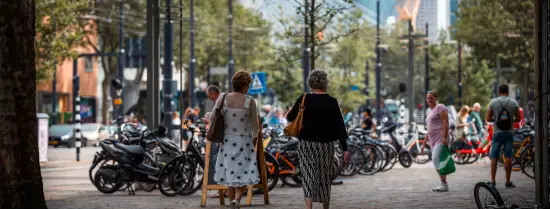
Older people are living at home for a longer time, but is their neighbourhood age-friendly? Warsha Jagroep of Erasmus School of Health Policy & Management asked elderly Surinamese people about their neighbourhood for her PhD thesis. It does not always meet their needs, her research shows. This while Surinamese elderly on average exercise less and suffer more often from chronic diseases.
Why is the neighbourhood so important for the elderly?
"When you get older, your world literally and figuratively gets smaller. Elderly people are less vital and spend more time in their neighbourhood. So they get less far and they keep fewer and fewer friends and family. Once you retire, social interaction at work also falls away. Neighbourhood facilities affect well-being. This can be something very nifty, like paving stones that are not properly laid. You can also think about social facilities like community centres."
Why is it important to look specifically at the needs of Surinamese elderly?
"The Surinamese elderly are one of the largest groups with a migration background in the Netherlands, but they are often regarded as Dutch elderly. I partly understand this, because they do not have the same language barrier as Moroccan or Turkish elderly, for example. Yet my research shows that Surinamese elderly have different needs, for instance when it comes to social and physical activities. At the same time, you see that chronic diseases, such as Diabetes II, are more common among this group and that they exercise less. A spinning class does not always appeal to Surinamese elderly people, but traditional dance does appeal to them."
Your research played partly during the corona pandemic. What stood out then?
"Surinamese elderly were more self-reliant. They depend on community centres for social activities because their social network is often smaller. They do need emotional support, such as a chat. Putting plants on benches not only made them walk less, but also made older people less likely to have contact. Furthermore, Surinamese elderly did not always understand the information from the press conferences. In this, they could not fall back on their network to get correct information or to understand it better."
You not only took questionnaires, but also spoke to many Surinamese elderly people. What struck you most?
"It was quite difficult at the beginning to find elderly people who wanted to cooperate. They are not very familiar with this kind of research and are attached to their privacy. Once they put a face to it, everyone wanted to help me. They then first wanted to know where in Suriname my roots are. Some elderly people still message me. One lady even comes specially from Amsterdam for my PhD defence. Also, I could never leave without being offered something to eat."
Talking about food; what role does food culture play among Surinamese elders?
"Food is very important to them. They like it when there is a toko nearby where they can get typical Surinamese vegetables and spices. Yet there is not a clear understanding of what exactly is healthy. For instance, elderly Surinamese people often think that bitter vegetables are good for sugar levels. A low-threshold intervention could therefore be a cooking workshop in which the elderly learn how to prepare a healthy and tasty traditional meal. That can go hand in hand just fine."
What do you see as the most important lesson from your research?
"The elderly population is becoming increasingly diverse, and I think we need to be more aware of that. The wishes of different elderly populations are not the same, while neighbourhood facilities are very important for well-being. You also see that the more facilities there are, the more this acts as a kind of buffer. So if you have a strong social network, it might not be as bad that there is no toko in the neighbourhood. It is often the case in life that you cannot get everything you would like."
- PhD student
- Related content
